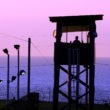But in terms of deterrence, what you have gone through in and of itself would deter anyone who thinks they can lightly take information from a government computer and in any way set out on their own path….[A]s I’ve already indicated, I don’t think that deterrence should include an American citizen waiting two and a half years after their home is searched to find out if they’re going to be indicted or not. I find that unconscionable. Unconscionable. It is at the very root of what this country was founded on against general warrants of the British. It was one of the must fundamental things in the Bill of Rights that this country was not to be exposed to people knocking on the door with government authority coming into their homes. And when it happens, it should be resolved pretty quickly, and it sure as heck shouldn’t take two and a half years before someone’s charged after that event. And that weighs heavily, obviously, upon this judge.
Persecuting Whistleblowers
“John Kiriakou is the new Thomas Drake,” Jesselyn Raddack said when the former CIA agent’s indictment was unsealed in April. “And the Obama administration’s unprecedented use of the Espionage Act to target whistleblowers sends a chilling message to any national security worker considering blowing the whistle on corruption and wrongdoing.”
Radack, a former whistleblower, directs the National Security and Human Rights office at the non-profit Government Accountability Project. She represented Drake, whom Barbara Koeppel interviewed in this issue. As director of counterintelligence in Pakistan after 9/11, Kiriakou led the team that captured suspected Al Qaeda operative Abu Zubaydah.
And yet Kiriakou had refused to be trained in torture interrogation tactics. In December 2007, he went on-camera with ABC News, where he said Zubaydah was waterboarded and that waterboarding is torture.
He subsequently reported on the agency’s torture program in a book he published in 2009, The Reluctant Spy: My Secret Life in the CIA’s War on Terror.



0 Comments